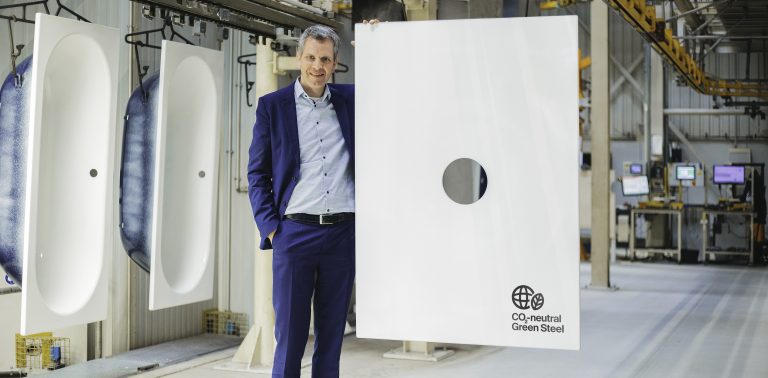Bette is celebrating a new milestone; to date, the company has created 100,000 bathroom products from green steel for sustainable bathroom design.
Bette manufactures its baths, shower trays and washbasins from glazed titanium steel and began sourcing and using CO2-neutral steel in 2020. Now the company is celebrating a major milestone: the production of 100,000 bathroom products made of ‘green’, CO2-neutral steel.
“We are celebrating an important milestone on our path to greater sustainability: each of these 100,000 bathroom products represents our commitment to a greener future and sustainable interior design,” says Bette Managing Director Thilo C. Pahl. By using green steel, the company, based in Delbrück, Germany was able to reduce its CO2 emissions by ten per cent in 2021, and in 2022 the reduction was almost 40 per cent, corresponding to around 8,000 tonnes of CO2.
As part of its commitment, Bette also wants to support sustainable steel production in Germany and its steel suppliers switching from fossil to regenerative blast furnaces, even though these are around three times more expensive. Bette is doing this at no extra cost to its customers.
Steel becomes ‘green’ through suppliers continuously investing in measures to reduce their CO2 emissions. At steel manufacturer ArcelorMittal, for example, this commitment is documented by certificates assigned to individual steel blanks, making them CO2-neutral. This in turn has a positive impact on Bette’s overall CO2 emissions and is also visible at product level.
Currently, subject to minimum quantities, Bette can offer certain products made of CO2-neutral steel, and, in the future, there will be product ranges made exclusively from this ‘green’ steel.
The 100,000 product milestone is only a step on the way to Bette’s ambitious goal: by the end of 2024, the company wants to manufacture half of its products from green steel. In addition, Bette is continuously working on optimising its use of resources. Processes and procedures along the entire supply chain are constantly reviewed to ensure they are as resource-efficient as possible. For many years, the bathroom specialist has also been using combined heat and power plants and photovoltaics to generate energy in order to largely produce its own electricity and heat.
However, the company’s biggest source of emissions remains its product. That is why Bette not only attaches importance to sustainably produced, recyclable and quality products that are also long-lasting in terms of aesthetics and comfort, but also takes care to avoid overproduction. Around 70 per cent of Bette’s baths, shower trays and washbasins are made to order; the remaining 30 percent are stock items.
Thilo C. Pahl: “We are proud of what we have achieved so far, but we know that our work does not end here. Our commitment to sustainability is a long-term process and we will continue to innovate, research and look for ways to do our part to create environmentally friendly bathrooms.”
A counter on the Bette website provides information on the current number of bathroom products produced from green steel: https://www.my-bette.com/en/about-us/sustainability
 </
</
